- Last Updated: January 15th, 2026
Key Takeaways
It's critical to pursue legal action for social media addiction when it causes substantial harm, as this can drive platforms to implement necessary changes and take accountability.
Victims of social media addiction have various legal remedies available, including personal lawsuits, class actions, regulatory complaints, and seeking injunctions against harmful platform practices.
Social media addiciton litigation is on the rise against social media companies for their role in fostering addictive behaviors through psychologically manipulative features.
Overview of Social Media Addiction
On this page, we’ll provide an overview of when to pursue legal action for social media addiction, identifying evidence of addiction caused by social media, filing a lawsuit for social media addiction, and much more.
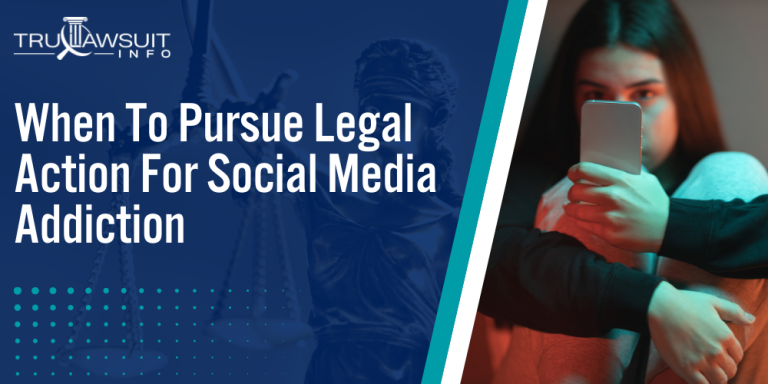
Intro to Social Media Addiction
Important considerations regarding a social addiction lawsuit include, but are not limited to:
- Claims Against Platforms: Accusations focus on the platform’s design decisions and algorithms, which are alleged to foster addictive usage patterns.
- Documenting the Impact: Evidence is crucial, including medical records and expert testimony, to establish a link between Instagram use and negative mental health outcomes.
- Expert Legal Support: Finding a lawyer with expertise in technology and social media law is essential for effectively presenting your case.
- Seeking Justice: Lawsuits aim for compensatory measures for sufferers, potentially influencing platform policy changes.
If you or a loved one have experienced mental health issues after developing a social media addiction, you may be eligible to file a social media addiction lawsuit.
Contact TruLawsuit Info for a free consultation, or use the chatbot on this page for a free case evaluation.
TruLawsuit Info: Legal Action For Social Media Addiction
Question: When to pursue legal action for Social Media Addiction?
Answer: Legal action for social media addiction can be pursued when an individual, especially a teen or young adult, has experienced serious mental health issues as a consequence of the addictive design of social media platforms.
To understand the impact and trajectory of these lawsuits, it’s essential to recognize the substantial legal hurdles they entail and their significant implications for the tech industry at large.
Youth Mental Health Crisis: Social Media Addiction
The pervasive nature of social media sites has prompted a closer examination of its impact on youth mental health, particularly where signs of behavioral addictions like social media addiction surface.
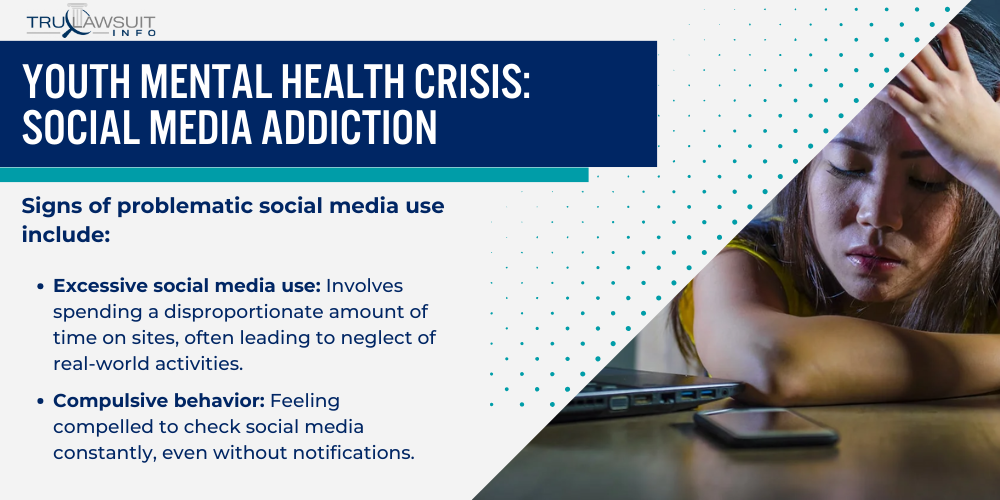
Defining Problematic Social Media Use
Problematic social media use is recognized when habitual engagement with platforms interferes with daily life, personal relationships, and mental well-being.
This behavioral addiction exhibits characteristics akin to internet addiction but with a specific focus on social media platforms.
Signs of problematic social media use include:
- Excessive social media use involves spending a disproportionate amount of time on sites, often leading to neglect of real-world activities.
- Compulsive behavior: Feeling compelled to check social media constantly, even without notifications.
- Mood modification: Using social media as a way to alter moods or escape reality.
- Tolerance: Needing to spend more time on social media to gain the same level of satisfaction.
- Withdrawal symptoms: Experiencing unease, anxiety, or depression when not using addictive social media or being unable to access it.
- Relapse: Returning to excessive use after a period of cutting down.
Signs and Symptoms of Social Media Addiction
Recognizing the signs and symptoms of social media addiction is crucial for early intervention.
Key indicators of this addiction include:
- Increasingly neglecting responsibilities such as schoolwork, jobs, or chores to spend time on social media.
- Social withdrawal from real-life relationships in preference for online interactions.
- Experiencing jealousy or anxiety over others’ posts and interactions is indicative of emotional dependence on these platforms.
- Changed sleep patterns, such as staying up late or waking up to check social media, leading to sleep deprivation.
- Reduced interest in offline activities once enjoyed, resulting in a narrower scope of life experiences.
- Irritability or agitation when unable to engage with social media platforms.
Impact of Social Media Addiction on Health and Lifestyle
The increasing prevalence of social media addiction has sparked concerns over its repercussions on both mental and physical health. This condition involves being tied to a constant stream of digital interactions that can alter lifestyle choices and social habits.
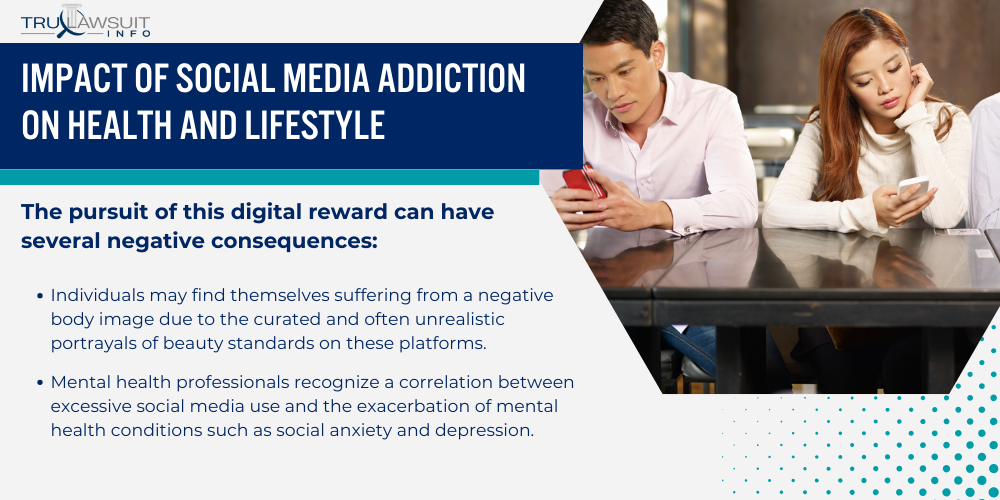
Effects on Mental Health
Social media use triggers the brain’s reward center, similar to other addictive behaviors, by providing intermittent, dopamine-driven reinforcement for prolonged engagement.
The pursuit of this digital reward can have several negative consequences:
- Individuals may find themselves suffering from a negative body image due to the curated and often unrealistic portrayals of beauty standards on these platforms.
- Mental health professionals recognize a correlation between excessive social media use and the exacerbation of mental health conditions such as social anxiety and depression.
- A dependency on virtual validation can contribute to poor mental health, where self-worth becomes intricately tied to online feedback.
- Persistent exposure to social media often decreases face-to-face interactions, impairs social skills, and increases feelings of loneliness and social anxiety.
Effects on Physical Health
The negative consequences of social media addiction aren’t limited to mental health; they extend to one’s physical health as well.
Physical health impacts arising from excessive social media use include:
- Excessive screen time can directly reduce the time spent on physical activity, contributing to a sedentary lifestyle.
- Prolonged periods of inactivity and screen usage can lead to issues such as eye strain and poor posture.
- Sleep patterns are often disrupted by late-night scrolling, which can lead to chronic sleep deprivation.
- Regular engagement in a virtual environment can diminish opportunities for real-life, physical health-enhancing activities.
Legal Considerations: Social Media Addiction Lawsuit
When considering a lawsuit for social media addiction, it is vital to understand the legal grounds for action and review existing precedents.
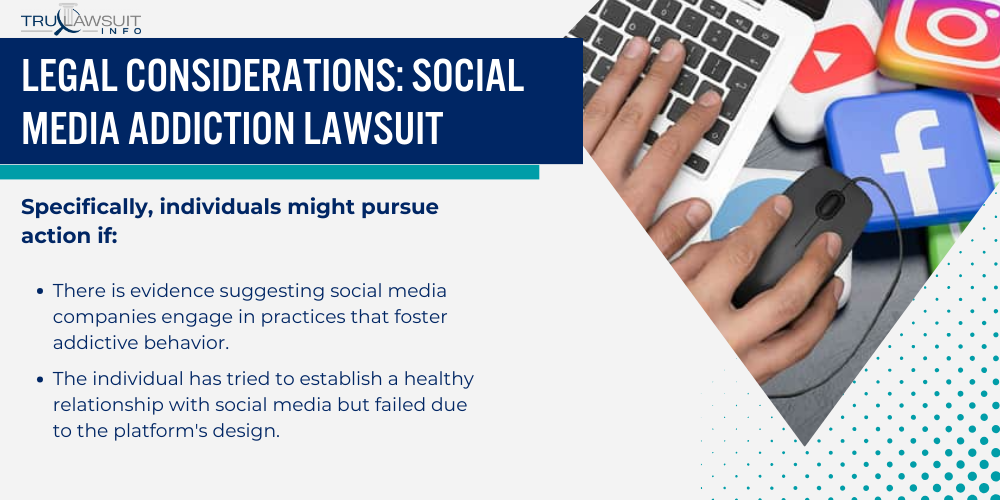
These components are essential when determining the viability of a case.
Grounds for Legal Action
Initiating a legal claim for social media addiction requires a clear rationale.
Specifically, individuals might pursue action if:
- There is evidence suggesting social media companies engage in practices that foster addictive behavior.
- The individual has tried to establish a healthy relationship with social media but failed due to the platform’s design.
- There’s a clear link between the platform’s use and the decline in the individual’s mental health, despite seeking professional help or support from support groups.
- The individual has suffered quantifiable harm, such as psychological distress or a deterioration in personal relationships.
Existing research suggests that these platforms may be designed to create positive feedback loops that encourage continued and frequent use, leading to potential legal claims.
Precedents and Cases
While the landscape of social media addiction lawsuits is evolving, several key cases and decisions outline the trajectory of litigation in this area.
Reviewing important cases, one will find:
- A range of settlement amounts have been hypothesized, based on the strength of an individual claim and litigation direction, with potential figures between $10,000 to over $100,000, although these are not guaranteed.
- Certain state courts have permitted similar suits to advance, reflecting a willingness to scrutinize the legal shield normally protecting tech companies, as in the case of social media addiction suits currently facing their first legal tests.
- Jurisprudence about social media’s role in causing a youth mental health crisis is still being shaped, with pending litigation that could set significant legal precedents challenging how social media platforms operate.
- Psychological literature may serve as an evidentiary basis for arguing that social media use results in mental health decline, thereby supporting the claims in lawsuits.
Preventing Social Media Addiction
Effectively preventing social media addiction requires implementing both educational initiatives and policymaking measures to enhance awareness and establish regulatory controls.
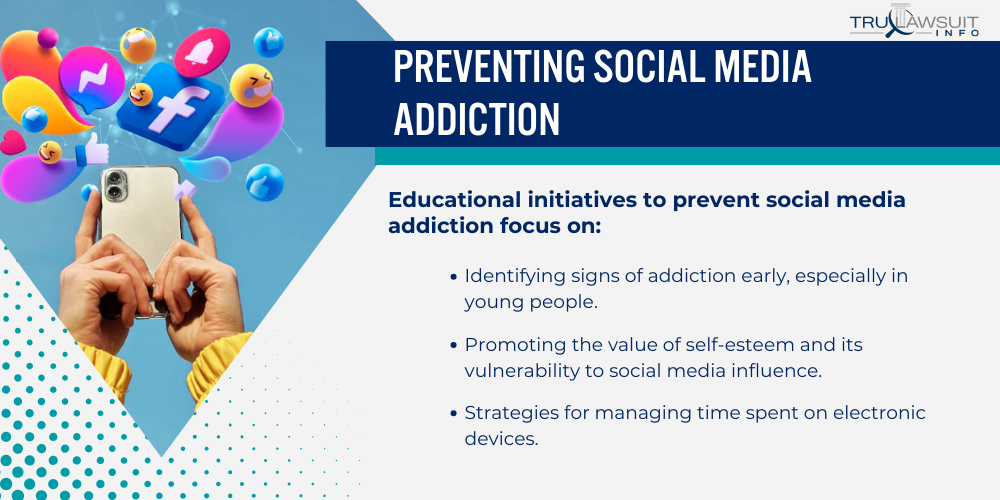
This approach aims to foster a healthy relationship with technology, particularly for young users.
Educational Initiatives and Awareness
He, she or they can combat social media addiction through educational programs designed to highlight the risks of excessive internet use and addictive behaviors.
Educational initiatives should focus on:
- Identifying signs of addiction early, especially in young people.
- Promoting the value of self-esteem and its vulnerability to social media influence.
- Strategies for managing time spent on electronic devices.
- The importance of maintaining a healthy relationship with technology.
Policymaking and Regulatory Measures
Policymakers play a crucial role in curbing social media addiction by introducing measures to protect especially young users.
They should consider:
- Establishing age restrictions for social media platforms.
- Regulating app notifications to reduce their addictive lure.
- Mandating that platforms include features that track and limit time spent online.
- Implementing safeguards against content that could lower self-esteem.
The goal of these measures is to support healthy internet use and make platforms less conducive to fostering addictive behaviors.
Regulatory measures are most effective when they are adaptive and consider the rapidly evolving nature of social media and its impact on users’ lives.
Contact TruLawsuit Info
If you believe that you or a loved one has suffered from social media addiction due to the irresponsible practices of social media platforms, TruLawsuit Info may be able to provide the necessary guidance.
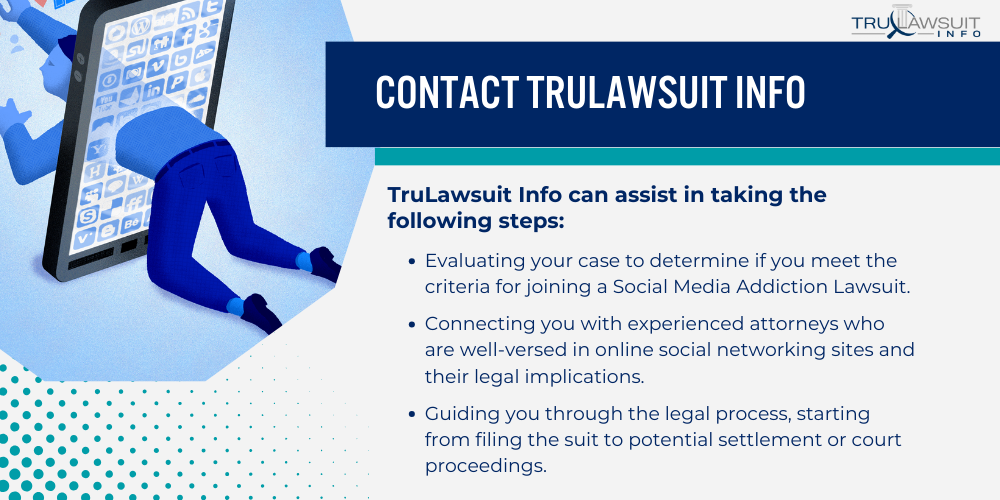
They offer services specifically tailored to tackle legal challenges related to popular social media platforms.
TruLawsuit Info can assist in taking the following steps:
- Evaluating your case to determine if you meet the criteria for joining a Social Media Addiction Lawsuit.
- Connecting you with experienced attorneys who are well-versed in online social networking sites and their legal implications.
- Guiding you through the legal process, starting from filing the suit to potential settlement or court proceedings.
- Informing you of your rights and potential compensation related to harmful exposure from the use of these platforms.
Those affected by the negative impacts of popular social media platforms should consider the following actions:
- Reach out to TruLawsuit Info for an instant case evaluation via chat.
- Discuss the particulars of your situation to understand the legal grounds for a lawsuit.
- Become informed about previous legal actions taken against social media companies.
- Learn about systemic changes that legal action aims to achieve for better user protection.
TruLawsuit Info is positioned to facilitate users in holding social networking sites accountable. They stand ready to leverage their knowledge to support individuals impacted by social media addiction.
Frequently Asked Questions
-
Individuals may pursue legal action against social media platforms if they believe the platform’s design or features have contributed to an addiction.
Essential elements include demonstrating how the platform’s algorithms and design intentionally made it addictive, with the result being quantifiable harm.
-
Litigation against social media companies has focused on the alleged design and algorithms that foster addiction and deteriorate mental health.
Courts have examined the causal link between platform use and negative mental health outcomes, along with the companies’ knowledge of these effects.
-
To pursue a social media addiction lawsuit, plaintiffs must provide evidence of sustained use despite negative consequences and demonstrate that the platform was a significant factor in causing the addiction.
Expert testimony on addictive design features and personal mental health records are often pivotal.
-
While legal cases against social media platforms are relatively new, courts have allowed such lawsuits to proceed in some instances.
These cases investigate whether social media platforms knowingly exploited psychological vulnerabilities to create addictive behaviors.
-
Potential outcomes of a lawsuit against social media companies could range from financial compensation to mandated changes in platform operation.
Settlement amounts can vary, and in some instances, precedents may be set for tech companies’ responsibility regarding their users’ health.
-
Social media addiction statistics reveal that younger age groups, especially teenagers and young adults, are more prone to addiction due to heavy usage of platforms like Instagram and TikTok.
Older demographics, while less affected, also experience addiction risks with platforms such as Facebook.

Attorney Jessie Paluch, founder of TruLawsuit Info, has over 25 years of experience as a personal injury and mass tort attorney, and previously worked as an international tax attorney at Deloitte. Jessie collaborates with attorneys nationwide — enabling her to share reliable, up-to-date legal information with our readers.
Legally Reviewed
This article has been written and reviewed for legal accuracy and clarity by the team of writers and legal experts at TruLawsuit Info and is as accurate as possible. This content should not be taken as legal advice from an attorney. If you would like to learn more about our owner and experienced injury lawyer, Jessie Paluch, you can do so here.
Fact-Checked
TruLawsuit Info does everything possible to make sure the information in this article is up to date and accurate. If you need specific legal advice about your case, contact our team by using the chat on the bottom of this page. This article should not be taken as advice from an attorney.
You can learn more about the Social Media Harm Lawsuit by visiting any of our pages listed below:
Here, at Tru Lawsuit Info, we’re committed to helping victims get the justice they deserve.
To do this, we actively work to connect them with attorneys who are experts in litigating cases similar to theirs.
Table of Contents
Tru Lawsuit Info is a reliable source of information about issues that may affect your health and safety, such as faulty products, data breaches, and environmental hazards.
Our team of experienced writers collaborates with medical professionals, lawyers, and advocates to produce informative articles, guides, and other resources that raise awareness of these topics.
Our thorough research provides consumers with access to reliable information and updates on lawsuits happening around the country. We also can connect consumers with attorneys if they need assistance.
Here, at Tru Lawsuit Info, we’re committed to helping victims get the justice they deserve.
To do this, we actively work to connect them with attorneys who are experts in litigating cases similar to theirs.
